- Home
- Joy Fielding
Heartstopper Page 10
Heartstopper Read online
Page 10
(Torrance’s own Ginger Rogers!
Check out that hilarious picture of her and
Loony Lipsman)
the jilted wife of that handsome scoundrel, Dr. Ian, who you know from previous e-mails is currently making house calls to Torrance’s resident sex pot,
KERRI FRANKLIN,
who just happens to be DELILAH’S mother.
THAT’S ONE HOT MAMA!!!!
We’d sure love to get into those short shorts she wears.
And speaking of shorts, DELILAH’S new handle is really SHORT.
So short, it’s just an initial. DEE.
That’s BIG D, to you, fella.
You’re from BIG D, my oh, yes!!!!!!
Remember that old song? My Daddy used to sing it all the time. Except there’s a new set of lyrics now. They go—DRUM ROLL, PLEASE!!!!!-(and get out your dancing shoes, Mrs. Crosbie)—
Yes, I’m in Deli, where every hole is smelly,
And the boys all eat her after class,
Yes, you’re in Big D, my oh, yes,
I said, Big D, stinky hole, double chin, and a big fat ass!!!!!!
“Oh, God,” Megan whispered. Not only had that awful posting been there for days, but now someone had added to it. Torrance’s own Ginger Rogers! Check out that hilarious picture of her and Loony Lipsman. Get out your dancing shoes, Mrs. Crosbie!
What was the matter with her mother anyway? Why did she always have to inject herself into the middle of everything? Wasn’t it bad enough she was a teacher at Megan’s school, so that Megan never had any privacy, never any space of her own? When she went to school, there was her mother; when she came home, there was her mother. And if her continual presence wasn’t bad enough, did she always have to go sticking her nose into everyone else’s business? Didn’t she realize that every time she butted in where she didn’t belong, she exposed her family, her daughter, to potential ridicule? Was that why her father left? Because he couldn’t stand the fact she was always around?
Megan could still hear her mother ranting when she’d seen the picture upon her return from school this afternoon: There was no such thing as privacy anymore! Someone was always lurking with a camera! Some idiot was always eager to post the picture! The bullies were everywhere! That quickly segued into another of her familiar tirades: If you didn’t conform to their rigid dictates of what was acceptable, you didn’t survive! If a girl didn’t fit into a size two pair of jeans, if she didn’t wear her hair long and straight, if her nose wasn’t small and upturned, and her breasts large and round, she was a loser. Or worse, an object of scorn and ridicule, like Delilah Franklin. If a boy lacked six-pack abs, if he dressed differently, like Victor Drummond, or was quiet and sensitive, like Brian Hensen, then he was a weirdo, or worse, a homosexual. Since when had the standard of beauty become so narrow? Since when had young people become so intolerant? Why did everybody feel compelled to look and sound exactly the same? Why was everyone struggling so hard to be someone else? Were they so unhappy with who they really were?
Megan pushed her long, straight hair away from her perfect, oval face. She understood the pain behind her mother’s outrage, discerned the echo of the question she was really asking: How could your father leave me for a woman like Kerri Franklin? But while Megan recognized the truth of her mother’s remarks, sometimes she wished she would just shut up.
Still, she couldn’t help but feel sorry for Delilah, who’d never done anything to deserve the kind of abuse that was regularly heaped on her. Of course, the girl did nothing to help her cause. Surely she could go on a diet, try to lose a few pounds, make more of an effort to fit in. Was she really as oblivious as she seemed?
Megan suddenly wondered what would happen if, God forbid, her father actually married Kerri Franklin. That would make Delilah her stepsister, and could she possibly imagine a worse fate? She’d worked so hard all year to make friends, and she was so close to being accepted into Torrance High’s inner circle, to being an actual confidante of Tanya and Ginger and Liana—where was Liana?—and to think of the ridicule she’d be subjected to if she and Delilah were actually to become family! No, it was too awful to contemplate.
Just as it was too awful to think about what might have happened to Liana. The school was rife with rumors: she’d run off because she was pregnant and Peter had refused to marry her; she’d died during a botched abortion; she’d eloped with some older guy she’d met on the Internet; she’d been raped and strangled by a sexual predator, her body dismembered and scattered throughout the Everglades, like pieces of discarded, stale bread.
Megan closed her eyes, her fingers absently scrolling down the screen, as she tried not to picture Liana Martin’s voluptuous body serving as alligator fodder. When she looked up again, the offensive e-mail had been replaced by another posting.
UPDATED FAGGOT LIST
Victor Drummond
Perry Falco
Jason O’Malley
Brian Hensen
Tommy Butterfield
Donny Slaven
Rick Leone
Ron Williams
Tim Crosbie
“Oh, God,” Megan said again, seeing her brother’s name at the bottom of the list. She felt instantly sick to her stomach. Had Tim seen it? Of course he’d seen it. “The whole school has seen it,” she whispered.
There was a knock on her bedroom door. “Megan,” her mother said. “Didn’t you hear me call you? I said your father is waiting.”
Megan felt her mother lingering on the other side of the door. “I’ll be right there.”
A second’s hesitation, then: “Well, hurry up.”
“Two minutes.” Surely her mother and father could spend a few minutes alone together without fighting.
Her mother would have a fit when she saw this latest posting, Megan knew, snapping off the computer without going through the appropriate channels, and hearing it groan in protest. She’d assume Joey and Greg were responsible, just as they were responsible for posting that stupid picture of her and Mr. Lipsman, and that awful song about Delilah. Were they?
Well, obviously Joey. But surely not Greg.
Megan pushed herself away from her desk, grabbed her purse from the floor, and threw it across the shoulder of her white-and-green-striped cotton dress, then opened the door to her bedroom. She could hear her parents arguing even before she reached the living room.
“He looks fine,” her mother was saying.
“He looks like a punk,” her father countered. “I told you I was taking them to the golf club for dinner. You know that means a shirt and tie.”
“How would I know that? I’ve never been there.”
Silence. Megan could almost see the pinched expression on her mother’s face and her father’s fists clenching at his sides. The golf club was an especially thorny issue between them. Her father had argued that the cost of joining the expensive club was justified because of all the professional contacts he’d make, and her mother had acquiesced against her better judgment. The ink was barely dry on his deposit check when he’d moved out.
Now her father stood in the middle of the small, rectangular-shaped living room, shaking his head sadly, as if he were a helpless bystander at the scene of a horrific accident, trying to come to terms with what he’d just witnessed.
“Daddy, hi,” Megan said in greeting. She forced one reluctant foot in front of the other, praying there’d be no further eruptions.
“Sweetheart.” Her father’s arms surrounded her, and she felt her body stiffen involuntarily, her own arms freezing at her sides. She knew her mother was watching them. If she returned her father’s embrace, as she was desperate to do, her mother would take it as a betrayal, and her mother had been hurt enough. “You look gorgeous, as usual.”
Megan smiled her appreciation. So do you, she was thinking. Her father was one of those biologically blessed men who actually got better looking with age. He had a full head of thick, dark blond hair, eyes that were clear and blue, and lips that were
soft and inviting. Women had always found him attractive. Even her friends considered him “hot.” “Are we ready to go?” Megan asked. “I’m starving.” She wasn’t, but she thought it was probably a good idea to leave as soon as possible.
“No, we aren’t ready,” her father said. “Your brother has to change first.”
Megan glanced across the room to where her brother, Tim, sat slumped across the red velvet sofa, his sneaker-clad feet dangling over the armrest, kicking at the air as if it were water. Tim had their mother’s mouth and their father’s eyes, while his hair was an interesting combination of both—the same dark blond as Ian’s, but with Sandy’s stubborn curl. He was wearing a crinkled white shirt and baggy khaki pants. Tall, gangly, still not comfortable in his skin, he had no concept of his budding good looks, and therefore no idea of his potential power. “How about your blue blazer?” Megan suggested. “And that tie Grandma sent you for Christmas.” She bit down hard on her lower lip and closed her eyes, although not fast enough to miss the flash of pain that streaked across her mother’s face. Her mother had been disappointed when they’d been unable to travel back north for the holidays because of Ian’s “busy schedule.”
(“Busy schedule, my rear end,” she’d railed later.)
“Ties are stupid,” Tim muttered.
“They’re a sign of respect.”
Megan knew her brother was thinking, Who are you to talk about respect? She also knew he’d never say such a thing out loud. “Hurry up, Tim,” she said before anyone could say anything. “I’m starving.”
With exaggerated slowness, Tim arched his legs into the air and lowered his feet to the cold tile floor.
The floor—another sore point, Megan thought. Her mother had wanted to tear up the ugly, white squares and replace them with warmer, bleached-hardwood strips, but her father had insisted any renovations to the unimaginative, three-bedroom bungalow would have to wait another year. Now her father lived in a brand-new, modern apartment near the downtown core. Megan had chosen not to tell her mother about the apartment’s bleached-hardwood floors.
Tim finally managed to push himself off the sofa. He slouched from the room as if he were swimming through molasses.
“And comb your hair,” Ian called after him.
“His hair is fine,” Sandy said.
“It’s way too long,” Ian argued. “He looks like a punk.”
Megan felt her stomach cramp. “Can we just go?”
“What do you think, Megan?” her father asked.
“I think his hair looks nice,” Megan replied truthfully, avoiding his gaze.
“Of course you do.” Her father’s voice radiated disappointment, as if she’d let him down.
Megan stared at the now empty sofa, thinking that none of the furniture they’d brought down from Rochester suited the house. Everything was too dark, too heavy. It made the house feel claustrophobic. It made you want to get out.
She glanced at her mother, then quickly turned away, hoping to hide her sudden anger. What was the matter with the woman, for God’s sake? Didn’t she want her husband to come back? Why was she wearing that stupid purple sweat suit that made her look hippy, even though she wasn’t? Was she purposely trying to look as unattractive as possible? Couldn’t she have worn some makeup, or at the very least a little lipstick?
“Sweetheart?” her mother asked. “Are you okay?”
“Fine,” Megan said. “Just hungry.”
“Tim,” her father called. “What’s taking you so long? Get your ass out here.”
Megan winced, felt her mother do the same.
“It takes a few minutes to put on a tie,” her mother reminded him.
“Not if he did it more often.”
“Then we probably should have stayed in New York” came the pointed retort.
Megan held her breath.
“Actually, I’ve been giving some thought to moving back to Rochester once the school year is over,” her mother continued.
She had? Her mother hadn’t said anything about that before.
“What are you talking about?” her father asked.
“Well, there’s really nothing to keep me here.”
Was this some sort of ploy on her mother’s part? Did she think that by threatening to go back to New York, she’d force her husband to come to his senses?
“What are you talking about?” he repeated. “What about the kids?”
“They’ll come with me.”
Is that what she wanted? Megan asked herself. To go back to Rochester? Now, when she was growing more popular every day, when it was only a matter of time before Greg asked her out?
“What about your job?” Ian was demanding. “Don’t you have a contract?”
“I’m sure that, given the circumstances, they’ll understand.”
“The circumstances,” Ian repeated knowingly. “So this is about getting back at me.”
“This isn’t about you.”
“You don’t think you’re being just a little bit selfish?”
“Excuse me? I’m being selfish?”
Tim came bounding back into the room, jacket half-on, half-off, tie dangling, no doubt propelled into action by the sound of his parents bickering. “Okay. I’m ready.”
“You aren’t taking my kids anywhere,” Ian said, as if Tim were invisible.
“I think they’re old enough to make that decision for themselves.”
What would she decide? Megan wondered. Did she really want to start in at yet another new school, to leave her friends, leave Greg?
Her cell phone sounded inside her purse. Megan reached inside the canvas bag, lifted the phone to her ear. She heard the voice on the other end of the line, tried to absorb the words she was hearing even as she felt the color drain from her face.
“What is it?” her mother asked, instantly at her side.
Megan dropped the phone back into her bag, stared at her mother through a thickening layer of tears. “That was Ginger Perchak,” she whispered. “They found Liana.”
Her mother stared at her without speaking, as if she already knew what was coming next.
Megan sank into the nearest chair, stared out the front window at the growing darkness. “She’s dead.”
NINE
Sheriff John Weber sat in his police cruiser at the side of the quiet residential street and tried to keep the bile from rising in his throat. In his almost twenty years in law enforcement he’d seen a lot of terrible things—the mangled corpses of car-accident victims, the slashed torsos of drunken brawlers, the swollen faces of battered wives that punctuated each and every Super Bowl. He’d seen victims of hunting accidents, of sexual assault, of willful neglect and abuse. He’d seen teenagers puke their guts out, wives cry their eyes out, children scream their lungs out. He thought he’d seen it all.
But he’d never seen anything like this.
A young girl, a girl he knew personally, a girl whose parents he knew well, a girl on the cusp of womanhood, her whole life ahead of her, with everything to live for—God, was there no cliché that didn’t apply?—lying in a makeshift grave about half a mile from where Ray Sutter had run his car off the road a few days earlier, half her head blown away by a bullet fired from close range, the rest of her feasted on by animals and insects, so that it would take the coroner days, if not weeks, to determine what other tortures she might have endured. Hell, he wouldn’t have known for sure it even was Liana Martin if Greg Watt hadn’t recognized the MOVE, BITCH T-shirt she was wearing. Greg had been part of a group of kids organized and led by Cal Hamilton, who’d reported it was either Greg or Joey Balfour who’d first come upon the suspicious mound of earth. John made a mental note to have his deputies question all three again later in greater detail, as well as Ray Sutter. (Could there have been a more sinister reason he’d been on that particular road earlier in the week?) Of course, the girl’s T-shirt was filthy and covered with blood, and he couldn’t imagine a lady like Judy Martin allowing her daughter to own such a t
hing, let alone wear it to school. He thought of Amber. Parents have so little control over their children’s lives once they reach a certain age, he realized, fighting back the threat of tears.
Not the first time tonight he’d had to struggle to keep his emotions in check.
But even the sight of Liana’s rotting corpse hadn’t been as awful as Judy Martin’s beautiful face contorting with grief when she heard the news of her daughter’s grisly death. John glanced over at the Martins’ neat white bungalow, with its black-and-white-striped awnings and ornately carved front door. He saw himself approaching the house, watched the front door open as he was reaching for the bell, saw the look of hope in Judy’s eyes turn quickly to trepidation and then, even faster, to horror, as she digested the terrible news. John doubted he’d ever be able to shake the image of the poor woman falling back against her husband’s chest, as if she’d been pushed, her body caving in against itself, like a collapsible chair. He saw her knees give way and her body sink to the floor like an anchor, her husband’s impotent arms unable to sustain her fragile weight. He heard the silent scream emanating from her twisted mouth. In seconds, he’d watched her age a lifetime. Her daughter’s lifetime, he realized now, with a sad shake of his head.
It had been almost an hour since they’d found Liana’s body. He’d had to call the coroner for Broward County, make the necessary arrangements, and wait until the girl’s body had been taken away before driving over to the Martins’ house, convinced they’d no doubt have heard the news already. As soon as Liana’s body had been pulled from that shallow grave, he’d seen members of the search party mumbling into their cell phones.
But as it turned out, nobody had wanted to be the first person to break the news to Howard and Judy Martin. They’d left that dubious honor to him. He’d also had to tell the Martins that, as yet, there were no suspects in their daughter’s death, although now that this was officially a murder investigation and no longer just a case of a teenager gone missing, his department would have to revisit every aspect of the case. That meant reinterviewing all Liana’s friends and acquaintances, as well as her fellow students and teachers—what was it Delilah had said about her science teacher having a thing for young girls?—and other, more peripheral characters like Cal Hamilton and Ray Sutter. John knew he’d probably end up talking to the whole town personally before the week was up. His shoulders slumped. He was tired already.

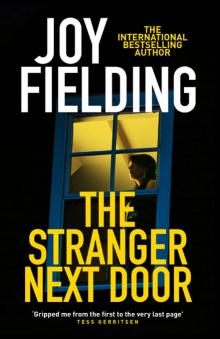 The Stranger Next Door
The Stranger Next Door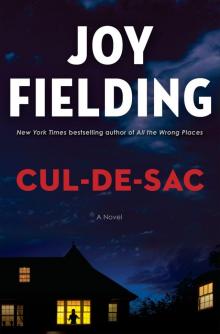 Cul-de-sac
Cul-de-sac The Final Act
The Final Act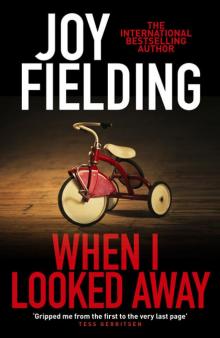 When I Looked Away
When I Looked Away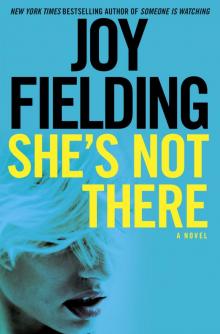 She's Not There
She's Not There All the Wrong Places
All the Wrong Places Now You See Her
Now You See Her Don't Cry Now
Don't Cry Now Good Intentions
Good Intentions Still Life
Still Life Lost
Lost The First Time
The First Time Whispers and Lies
Whispers and Lies The Other Woman
The Other Woman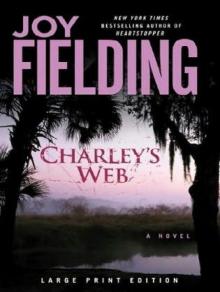 Charley's Web
Charley's Web Mad River Road
Mad River Road Puppet
Puppet Life Penalty
Life Penalty The Wild Zone
The Wild Zone Home Invasion
Home Invasion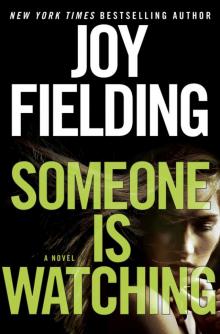 Someone Is Watching
Someone Is Watching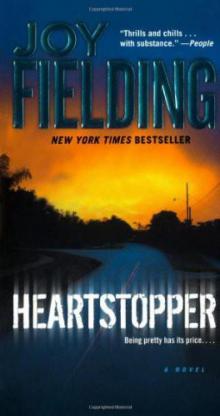 Heartstopper
Heartstopper See Jane Run
See Jane Run The Bad Daughter
The Bad Daughter Shadow Creek
Shadow Creek Missing Pieces
Missing Pieces Kiss Mommy Goodbye
Kiss Mommy Goodbye Grand Avenue
Grand Avenue